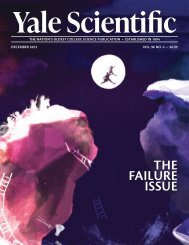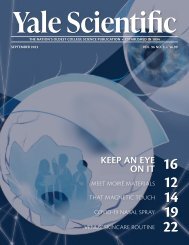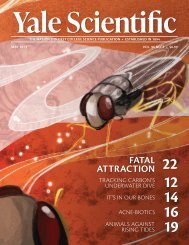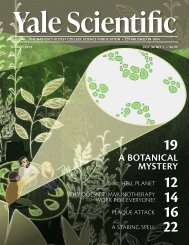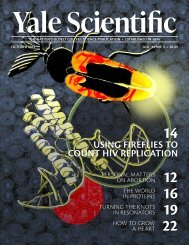YSM Issue 94.2
Create successful ePaper yourself
Turn your PDF publications into a flip-book with our unique Google optimized e-Paper software.
IMAGE COURTESY OF CARL ZIMMER
INTO THE
NEWSROOM
A CONVERSATION WITH
CARL ZIMMER
By Sophia Li
Carl Zimmer’s award-winning science journalism regularly
features in the New York Times. A Yale alum (’87) and
professor adjunct, Zimmer has also authored fourteen
books. His most recent, Life’s Edge: The Search For What It Means
To Be Alive, was published in March of this year.
This is an abridged version of YSM’s recent conversation with
Zimmer. For a full version, visit https://www.yalescientific.org/.
How did you get into covering for the New York Times?
I really loved to write and graduated from Yale as an English major. I
worked at Discover for ten years before deciding I just wanted to work
on my own projects and started writing for National Geographic and
Wired. In 2004, I pitched the idea of a science column to the NYT. The
editor who read my pitch was happy to talk about ideas and we started
off with a story on why leaves change color in the fall. And after that, I
started contributing stories to them until it became a weekly column.
How do you make scientific information understandable to a
broader audience?
When I start working on a story, I will get familiar with the research
that was important to make the new discoveries possible. Then I
just have long conversations. I’ll talk to scientists about their work.
I might talk to outside scientists to get an expert opinion. If it’s the
kind of research that affects people’s lives, I will talk to those people.
When writing, I always remind myself that I have spent several
days or weeks immersed in this subject, whereas my readers are
coming to it completely fresh. You have to tell a story that’s clear
and compelling enough that people who aren’t experts will want
to read and understand it.
You recently published your book, Life’s Edge. Where did the
idea for it come from?
A lot of people, even when they’re kids, wonder, “Well, what is
life exactly, and what does it mean that we’re alive?” If you ask your
parents you might not get a satisfying answer, and it turns out if
you ask scientists you might also not be satisfied, because everyone
seems to have a different definition of it. I talked with researchers
www.yalescientific.org
and philosophers, spending time to look at particularly weird and
amazing forms of life, whether it’s hibernating bats or slime mold
or just a maple tree. I start the book in the familiar heartland of
life, thinking about things no one would really argue are alive (like
ourselves) and then move out to the borderlands where it suddenly
gets much harder to decide whether things are alive or not.
You write, “All life gives way to half-life and then to no life at
all.” Through your investigation, do you have a different way of
characterizing life?
Something like a virus shows you how shaky the whole edifice of the
definition of life is. Definitions, as we think of them, are kind of arbitrary
hallmarks. You don’t really get at something fundamental about nature.
We can have some sort of rough and ready definition, but in Life’s Edge, I
compare it to asking an alchemist in the 1500s to define water.
They would probably say: It’s wet, it’s transparent, it’s liquid,
and if I make it cold it gets hard. But then you say: Then, the stuff
it becomes, is that water too? Then they would say: No, that’s ice,
because water as I just told you is liquid.
So, it’s kind of a meaningless exercise to ask an alchemist to
define water. What you really want is a theory of chemistry. You
can say: According to your theory you call that stuff water. What’s in
it are these molecules, and I can tell you what molecules are, and I
can tell you how this particular substance has molecules that contain
oxygen and hydrogen. It’s still water when it freezes because the
molecules just arrange in different shapes. So suddenly I’ve told you
something deep and profound about water because I have a theory
of it. However, we don’t have a theory of life that everyone agrees
on yet.
Do you have advice for Yalies who want to engage with scientific
writing?
It takes a lot of practice, so nobody should expect to do a
spectacular job their first time out. It’s a big challenge to learn
about complicated things and write about them in an exciting and
comprehensible way that’s as close to the truth as you can make it.
Try to write it the way you actually talk. Tell us a good story about
science and we’ll want to read it! ■
May 2021 Yale Scientific Magazine 39




